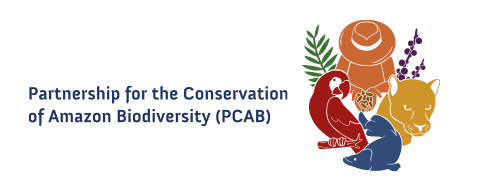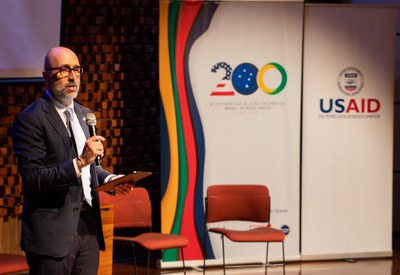USAID Promotes Documentary Showcasing Indigenous Struggles
April, 2024 – As part of the celebrations for the 200 years of diplomatic relations between Brazil and the United States, USAID hosted the screening of the Emmy-winning documentary "The Territory" in Brasília. The film tells the story of the Indigenous Uru-Eu-Wau-Wau People, their struggle to protect their territory, and their fight against deforestation in the Amazon rainforest.
“Indigenous Peoples are crucial to our planet's protection efforts, so it's fitting that we celebrate their contributions to history, environmental protection, and the fight against climate change during the month of April," said USAID/Brazil’s Director, Mark Carrato. “The partnership between our countries extends beyond governmental relations. The film also showcases the partnership between Brazilians and Americans,” he added.
The event marked the celebrations of Indigenous Peoples Day on April 19th. There was a roundtable discussion with Neidinha Bandeira – founding partner of the non-governmental organization Kanindé Ethno-Environmental Defense Association –, Txai Suruí – one of the film's producers who received the 2023 Brazilian Women Who Make a Difference Award, granted by the United States Embassy and Consulates in Brazil – and Bitaté Uru-Eu-Wau-Wau, president of the Uru-Eu-Wau-Wau Indigenous People's Association, along with director Alex Pritz and producer Gabriel Uchida.
“The Indigenous Peoples' struggle is global. In the current climate emergency affecting our territories, we are talking about the future of our children, the next generations. There's no more time,” said Txai Suruí. “Art has the power to touch. 'The Territory' was a great film because it truly depicts our reality. It does something that the indigenous movement and women often talk about: reforesting minds and hearts,” Txai added.
During the event, USAID's Environmental Program Director, Catherine Hamlin, highlighted the Agency's partnership with Indigenous Peoples in Brazil. “Our countries have a long history of friendship and partnership. One of the strongest collaborations is in the environmental field and the promotion of Indigenous rights. USAID has been working in partnership with Indigenous Peoples in Brazil for decades, supporting projects in various areas.”
Globally, USAID promotes initiatives to ensure Indigenous rights. In Brazil, it supports the implementation of the National Policy for Territorial Management of Indigenous Lands (PNGATI), a policy that contributes to the protection, conservation, and restoration of territories.
Importance – Indigenous Peoples, with their ancestral cultures, have a significant contribution to developing sustainable solutions capable of conserving their territories and protecting the environment. They are a key actor in discussions and efforts to conserve Amazon’s and its biodiversity.
Among the contributions of these populations are, for example, adapting socio-biodiversity product chains, specially fruit species, and developing the "terra preta" – a mixture of cassava peels, turtle shells, and fire residues, creating a soil rich in organic matter for agriculture.
The native fruit plants are about 50 species managed by Indigenous Peoples, including the Brazil nut, açaí palm, and guaraná, allowing for livelihoods without deforestation. According to the latest Census, the Indigenous population residing in Brazil totals 1,693,535 – representing 0.83% of the country's residents.


